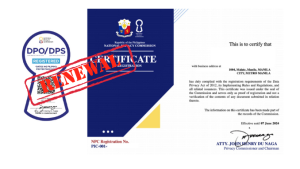If you’ve spent some time in Manila, you may already be familiar with an area notorious for document forgery in the Philippines. Despite ongoing efforts by law enforcement to combat these illegal activities, many still operate covertly.
Counterfeit documents, including government-issued IDs, college theses, professional licenses, and school records, are commonly produced and sold. These documents are used for fraudulent activities, such as identity theft, opening fake bank accounts, and securing employment or business permits under false pretenses.
Now, the availability of these counterfeit documents raises concerns about the ease with which personal information can be manipulated. As such, it is imperative for businesses and authorities to adopt stringent identity verification processes to prevent fraud and ensure the authenticity of received documents.
This article delves into identity checks, their purposes, and the steps typically followed by background check investigators in the Philippines. Read on and tell us in the comments how we can assist you with your information verification needs.
What is an Identity Check?
An Identity Check, also known as identity verification or personal information validation, is a type of background check conducted to confirm that an individual who seeks to do business with an organization or apply for a job is truly who he or she claims to be.
Generally, an identity check is done by validating personal information, such as a government-issued ID (passport, UMID, driver’s license, etc.), biometric data (fingerprints, facial recognition, etc.), or other personal details (name, address, date of birth, etc.) against trusted records or databases.
Purposes of Identity Checks
Verifying candidates’ personal information serves several important purposes, especially in the context of recruitment, employment, and legal compliance. Here are the top purposes of conducting identity checks:
Ensuring Authenticity and Preventing Fraud
Verifying candidates’ personal details against trusted databases helps confirm that the information provided by candidates is accurate and truthful. This reduces the risk of fraud or dishonesty, such as falsified qualifications, work history, or personal information.
Compliance with Legal and Regulatory Requirements
Some industries, especially those dealing with sensitive data or finances, require compliance with legal regulations such as Know Your Customer (KYC), Anti-Money Laundering (AML), or other labor laws. Verifying identities helps ensure that they are compliant with legal requirements and avoid potential penalties or issues with regulatory bodies.
Ensuring Tax and Social Security Compliance
Checking candidates’ details, for example, with tax (BIR) and social security (SSS) databases, helps confirm they are properly registered and compliant with government requirements. This verification ensures that candidates are not only eligible to work but also are paying their taxes and contributing to social security.
Improving Overall Hiring Process Efficiency
By using trusted databases for verification, the hiring process becomes more streamlined. Employers can quickly validate the critical information provided by the candidate, reducing the time and resources spent on manual verification.
About SSS, BIR, and Their Databases
With FilePino’s identity checks, personal details or identities are verified against the databases of trusted government agencies, such as the Bureau of Internal Revenue (BIR) and the Social Security System (SSS).
The Bureau of Internal Revenue (BIR) is responsible for collecting taxes and managing the country’s overall tax system. It also registers taxpayers, issues Taxpayer Identification Numbers (TIN), and enforces tax compliance through audits, filings, and penalties for tax evasion.
The Social Security System (SSS), on the other hand, provides social insurance for private-sector workers, offering benefits for retirement, disability, sickness, and death. It also mandates regular contributions from both employers and employees, which fund benefits and financial assistance for qualified members.
Both the BIR and SSS maintain extensive and authoritative databases containing personal and financial information of taxpayers and members, respectively. The BIR’s database tracks tax records, filings, and payment histories, while the SSS database holds records of social security contributions, employment history, and benefit claims.
Given their official nature, adherence to strict regulations, and continuous government oversight, these databases are considered highly credible and reliable for identity verification, providing accurate information to confirm the legitimacy of employees or candidates in the Philippines.
Quick, Easy, and Secure!
with your Background Check in just a few clicks!
Fill out the online order form, make a secure payment via PayPal, and we’ll start the background check right away.
How We Conduct Identity Checks
We, at FilePino, follow a systematic approach to conducting identity checks, ensuring that the candidates’ or employees’ personal information is thoroughly verified and validated. Here’s how we carry out our identity checks:
1. Obtaining the Candidate’s Consent and ID Cards
We begin by securing the candidate’s explicit consent to perform the identity verification. We then request relevant identification documents, such as valid government-issued ID cards, which are essential for verifying personal details.
2. Accessing the SSS Online Database
For SSS data verification, we collaborate with our in-house payroll or statutory team to securely access the SSS online database. This allows us to verify the candidate’s or employee’s registered personal information, such as their name, address, birth date, marital status, and social security number.
3. Filing of BIR Form 1904
For BIR data verification, we fill out and file the BIR Form 1904 with the Revenue District Office (RDO) where the candidate or employee is registered. This process allows us to confirm their personal information, including their Tax Identification Number (TIN). While it does not establish the taxpayer’s compliance status, it can also be used to identify cases of multiple TINs, which is illegal in the Philippines.
4. Documenting Verified Information
Once all information is verified, we meticulously document the results in a detailed report. This ensures that every piece of personal data has been validated and accurately cross-checked with official government records.
5. Submitting Background Check Reports
Finally, we submit the report to our client, providing them with a verified and reliable record of the candidate’s identity while ensuring compliance with regulatory standards.
In conclusion, conducting identity checks plays a pivotal role in verifying the authenticity and integrity of candidates’ or employees’ personal information. By leveraging trusted government databases, like those maintained by BIR and SSS, it can be ensured that the information available is not only accurate but also compliant with legal and regulatory standards. When performed systematically, these checks can help reduce the risk of fraud and streamline processes like hiring and other business operations.
… and you might just need our assistance.
FilePino is a trusted leader in background check services in the Philippines. We conduct legally compliant, comprehensive, and fast background checks for a variety of purposes.
Ready to hire our background check investigators for an identity check? Set up a consultation with FilePino today! Call us at (02) 8478 5826 (landline) and 0917 892 2337 (mobile) or send an email to info@filepino.com.









